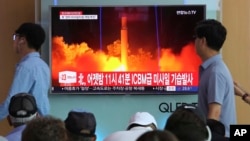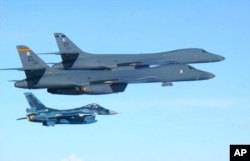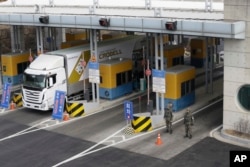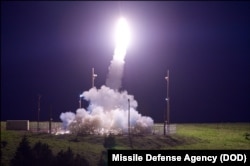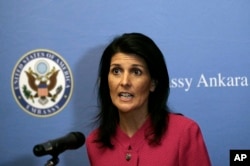North Korea’s latest test of an intercontinental ballistic missile is solidifying U.S. alliances in East Asia while exacerbating already difficult relations with adversaries in the region.
Most significantly South Korea’s position now seems more in line with Washington in emphasizing increased military deterrence and economic sanctions while downplaying for now the possibility for engagement with the Kim Jong Un government in Pyongyang.
“It might signal a more permanent and fundamental shift towards the direction that will strengthen the trilateral security cooperation among the U.S., South Korea and Japan,” said Bong Young-shik, a political analyst with the Yonsei University Institute for North Korean Studies.
However, security analyst Grant Newsham, with the Forum for Strategic Studies in Tokyo says it is too early to tell if the liberal Moon administration’s more hawkish turn is permanent.
“It seems to be a predictable pattern where the North provokes, South Korea gets angry, and then time passes and the forces for a softer approach reassert themselves,” said Newsham.
Failing engagement
Since taking office in May South Korean President Moon Jae-in has tried to pursue a dual track policy that balances pressure with engagement to ease tensions and restart talks with the nuclear North Korean state. The liberal leader sought to revive the past Sunshine Policy in which the economically advanced South tried to improve relations with the impoverished North through investment and aid.
But increased international sanctions made it difficult for Seoul to offer significant economic incentives like reopening the Kaesong Industrial Complex that employed thousands of North Koreans before it was closed following a 2016 nuclear test. And the Moon government’s recent offers of dialogue and humanitarian assistance have gone unanswered by the North.
“What the Moon Jae-in government really has to accept as a cold and hard reality is that things have changed since the days of the Sunshine Policy,” said Bong.
THAAD
Moon has now called for the full deployment of the Terminal High Altitude Area Defense (THAAD) missile defense system to proceed, reversing a decision last week to delay any further work on the project until an extended environmental study is completed. The system is currently partially functional with two of six mobile launchers operational.
South Korea's defense minister said Sunday the military will upgrade its Patriot missile system as well.
The THAAD deployment could anger Beijing which objects to the presence in the region of the advanced anti-missile battery that can potentially monitor China’s military activities using high-resolution radar. China had reportedly imposed informal economic restrictions on South Korea as retaliation.
US sanctions
President Moon, who is on vacation, and U.S. President Donald Trump are expected to soon talk by phone to discuss North Korea’s second purported successful test of an intercontinental ballistic missile that independent weapons experts said demonstrated the capability to reach many parts of the United States.
Japanese Prime Minister Shinzo Abe spoke with Trump Monday. A White House statement said that Trump and Abe agreed that North Korea "poses a grave and growing direct threat" to the U.S., Japan, South Korea and other countries, and that the two also committed to increasing diplomatic and economic pressure.
While the Trump administration has emphasized all options including military action are being considered to stop the growing North Korean nuclear threat, it has been focusing on working with China, the North’s key trading partner, to fully implement sanctions.
U.S. Ambassador to the United Nations Nikki Haley Sunday expressed frustration with China’s refusal to impose serious economic pain that would force North Korea to seek relief through compliance.
Haley said in a statement that she would not seek an emergency session of the United Nations Security Council “if it produces nothing of consequence.”
New sanctions
President Trump has also indicated he will soon sign a new bill passed by the U.S. Congress last week authorizing new sanctions against North Korea, Iran and Russia, that would ban Chinese entities that do illicit business with North Korea from the U.S. financial system.
Woo Su-keun, a North Korea analyst at Donghua University in Shanghai says Beijing opposes these secondary sanctions and argues that internal violations should be handled under Chinese law.
“China holds a point that it is not appropriate for Chinese companies to be sanctioned by a specific country, rather it can only be done by the U.N.," he said.
Trump, in tweets on Saturday, said America's "foolish past leaders" had allowed China to make billions of dollars a year in trade while allowing North Korea to develop its nuclear program.
On Monday Chinese Vice Commerce Minister Qian Keming said China-U.S. trade and North Korea are not related issues.
Youmi Kim in Seoul contributed to this report.




